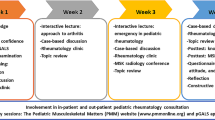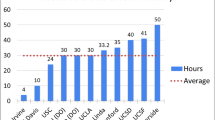Abstract
Adequate knowledge and clinical competency are essential for sound rheumatology practice. The aim of this study was the assessment of the adequacy of rheumatology education at the primary care level. Two hundred and ninety-seven primary care physicians participated in this cross-sectional survey. Participants were asked to complete a question survey and to take a previously validated rheumatology examination. The participants rated rheumatology education as important but rated the time spent on rheumatology education as poor. More than 80% of the participants reported a low level of confidence in performing a musculoskeletal physical examination. Of the participants, 75% scored 65% or less in the validated rheumatology examination. The findings of the present study indicate that medical education in rheumatology is inadequate at both the basic and clinical levels. The competence level of graduating physicians in musculoskeletal problem solving is inadequate. Furthermore, the time devoted to rheumatology education and training is disproportionately low compared to the frequency of musculoskeletal complaints encountered in general practice.


Similar content being viewed by others
References
Dequeker J, Rasker JJ, Woolf AD (2000) Educational issues in rheumatology. Ballieres Best Pract Res Clin Rheumatol 14:715–729
Weinstein SL (2000) 2000–2010: the bone and joint decade. J Bone Joint Surg Am 82(1):1–3
Woolf AD, Akesson K (2001) Understanding the burden of musculoskeletal conditions. The burden is huge and not reflected in national health priorities. BMJ 322(7294):1079–1080
Clawson DK, Jackson DW, Ostergaard DJ (2001) Its past time to reform the musculoskeletal curriculum. Acad Med 176:709–710
Mazzuca SA, Brandt KD, Katz BP, Li W, Stewart KD (1993) Therapeutic strategies distinguish primary care physicians from rheumatologists in the management of osteoarthritis. J Rheumatol 20:80–86
Glazier RH, Dalby DM, Badley EM, Hawker GA et al (1996) Determinants of physician confidence in primary care management of musculoskeletal disorders. J Rheumatol 23:351–356
Choudhry NK, Fletcher RH, Soumerai SB (2005) Systematic review: the relationship between clinical experience and quality of health care. Ann Intern Med 142:260–273
Ben-David MF (2000) AMEE guide No 18. Standard setting in student assessment. Med Teach 22:120–130
Spitzer WO, Harth M, Goldsmith CH, Norman GR, Dickie GL, Bass MJ, Newell JP (1976) The arthritic complaint in primary care: prevalence, related disability, and cost. J Rheumatol 3:88–99
Ahern MJ, Soden M, Schultz D, Clark M (1999) The musculoskeletal examination: a neglected clinical skill. Aust N ZJ Med 21:303–306
Day CS, Yeh AC (2008) Evidence of educational inadequacies in region-specific musculoskeletal medicine. Clin Orthop Relat Res 466:2542–2547
Jones JK (2001) An evaluation of medical school education in musculoskeletal medicine at the University of the West Indies, Barbados. West Indian Med J 50:66–68
Lynch JR, Gardner GC, Parsons RR (2005) Musculoskeletal workload versus musculoskeletal clinical confidence among primary care physicians in rural practice. Am J Orthop 34(10):487–491
Matheny JM, Brinker MR, Elliot MN, Blake R, Rowane MP (2000) Confidence of graduating family practice residents in their management of musculoskeletal conditions. Am J Orthop 29(12):945–952
Sneiderman C (1977) Orthopedic practice and training of family physicians: a survey of 302 North Carolina practitioners. J Fam Pract 4(2):247–250
DiCaprio MR, Covey A, Bernstein J (2003) Curricular requirements for musculoskeletal medicine in American medical schools. J Bone Joint Surg Am 85:565–567
Freedman KB, Bernstein J (1998) The adequacy of medical school education in musculoskeletal medicine. J Bone Joint Surg Am 80(10):1421–1427
Badley EM, Lee J (1987) The consultant's role in continuing medical education of general practitioners: the case of rheumatology. BMJ 20:100–103
Schmale GA (2005) More evidence of educational inadequacies in musculoskeletal medicine. Clin Orthop 437:251–259
Booth A, Wise DI (1990) General practice training in musculoskeletal disorders. Br J Gen Pract 40(338):390
Bolumar F, Ruiz MT, Hernandez I, Pascual E (1994) Reliability of the diagnosis of rheumatic conditions at the primary health care level. J Rheumatol 21:2344–2348
Disclosures
None
Author information
Authors and Affiliations
Corresponding author
Rights and permissions
About this article
Cite this article
Abou-Raya, A., Abou-Raya, S. The inadequacies of musculoskeletal education. Clin Rheumatol 29, 1121–1126 (2010). https://doi.org/10.1007/s10067-010-1527-y
Received:
Revised:
Accepted:
Published:
Issue Date:
DOI: https://doi.org/10.1007/s10067-010-1527-y




